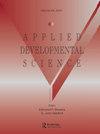家庭环境如何影响幼儿的语言和认知发展?来自中国城郊地区的证据
IF 1.5
3区 心理学
Q3 PSYCHOLOGY, DEVELOPMENTAL
引用次数: 1
摘要
研究表明,家庭环境的因素可能与认知和语言发展结果有显著关联。然而,人们对中国城郊地区的家庭环境知之甚少,0-3岁儿童的认知和语言迟缓率分别高达51%和54%。本研究利用从中国西南地区81个18-24个月幼儿的城郊家庭收集的数据,考察了刺激性育儿实践、家庭语言环境和父母自我效能感与认知和语言发展之间的关系。结果表明,刺激性育儿实践与认知发展显著相关,家庭语言环境与语言发展显著相关;父母自我效能感与认知发展明显相关。这些发现揭示了支持中国城市周边幼儿健康认知和语言发展的几种机制。本文章由计算机程序翻译,如有差异,请以英文原文为准。
How does the family environment affect toddlerhood language and cognitive development? Evidence from peri-urban China
Research suggests that elements of the family environment may have significant associations with cognitive and language development outcomes. Less is known, however, about the family environment in peri-urban China, where rates of cognitive and language delay in children aged 0-3years are as high as 51% and 54%, respectively. Using data collected from 81 peri-urban households with toddlers aged 18-24months in Southwestern China, this study examines the associations between stimulating parenting practices, the home language environment, and parental self-efficacy, with cognitive and language development. The results indicate that stimulating parenting practices was significantly associated with cognitive development, the home language environment was significantly associated with language development, and parental self-efficacy was significantly associated with cognitive development. The implications of such findings reveal several mechanisms for supporting healthy cognitive and language development among toddlers from peri-urban China.
求助全文
通过发布文献求助,成功后即可免费获取论文全文。
去求助
来源期刊

Applied Developmental Science
PSYCHOLOGY, DEVELOPMENTAL-
CiteScore
12.00
自引率
2.60%
发文量
23
期刊介绍:
The focus of this multidisciplinary journal is the synthesis of research and application to promote positive development across the life span and across the globe. The journal publishes research that generates descriptive and explanatory knowledge about dynamic and reciprocal person-environment interactions essential to informed public dialogue, social policy, and preventive and development optimizing interventions. This includes research relevant to the development of individuals and social systems across the life span -- including the wide range of familial, biological, societal, cultural, physical, ecological, political and historical settings of human development.
 求助内容:
求助内容: 应助结果提醒方式:
应助结果提醒方式:


